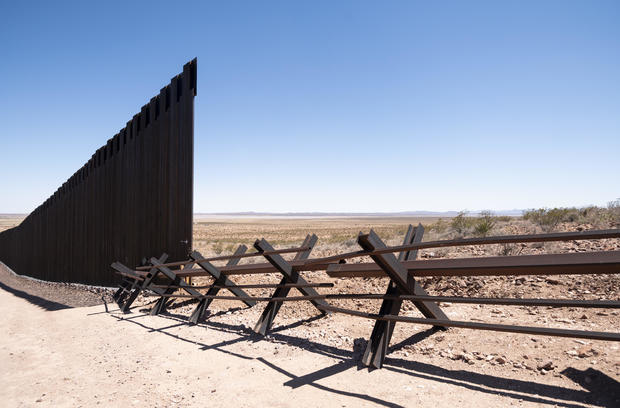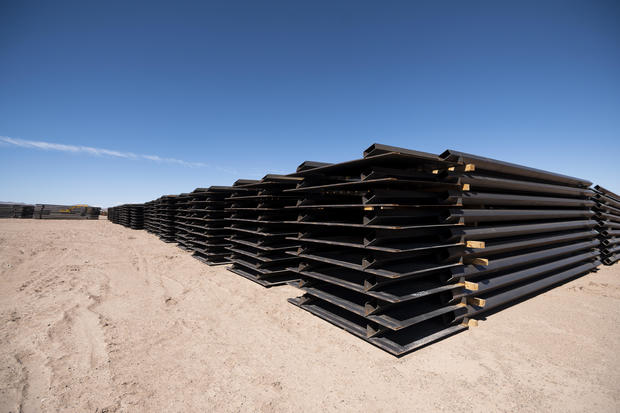The Department of Homeland Security (DHS) announced Monday it will use border security funding allocated by Congress to close wall gaps and pay for environmental and clean-up projects in areas of Arizona, California and Texas affected by barrier construction undertaken by the Trump administration. The projects authorized by Homeland Security Secretary Alejandro Mayorkas include installing drainage to prevent flooding, mitigating soil erosion, completing roads used by Border Patrol agents, demobilizing construction and equipment storage sites and discarding unused materials. Mayorkas also authorized U.S. Customs and Border Protection (CBP) to erect barriers to close "small" gaps along some wall sections that were left open when construction was brought to a halt in January, saying the measures are necessary to mitigate safety concerns. "There will be several places where barrier material will be used," a senior CBP official told CBS News. "We would say that that's existing barrier right there that we are addressing, like an open, unsafe construction situation, versus adding additional mileage, which would be adding new barrier." The work will also include fixing and completing wall gates, including ones used by Border Patrol to rescue migrants trapped in irrigation canals. Citing pending site assessments, the CBP official, who requested anonymity to discuss the plans, said the overall cost for the new projects has not yet been determined. The new construction and clean-up projects will take place in areas of the U.S.-Mexico border where the Army Corps of Engineers had been tasked to help build former President Donald Trump's wall. The corps is terminating wall construction contracts so DHS can assume control of the unfinished construction sites. The projects approved by Mayorkas are part of a broader Biden administration plan to wind down the sprawling Trump-era border wall construction effort, which became one of the most expensive federal infrastructure projects in U.S. history. Mr. Trump, who made construction of a border wall one of his main political aims, secured $15 billion to finance the project, most of which came from diverted military counternarcotics and infrastructure accounts. His administration ultimately built over 450 miles of border barriers, most of which replaced existing barricades. On the campaign trail, President Biden criticized the border wall project as ineffective and wasteful, vowing that his administration would not erect "another foot" of barriers. Hours after his inauguration, Mr. Biden ordered a halt to border wall construction and ended the national emergency his predecessor declared to divert military funds. Since then, his administration has been returning billions of unused Pentagon funds, many of which were initially allocated to finance construction at bases in the U.S. and overseas. But Congress also allocated $6 billion for border barrier construction between fiscal years 2018 and 2021, complicating Mr. Biden's campaign pledge. The Biden administration has urged Congress to cancel the unused funds, but has said that in the interim, it will focus on using the money to "address urgent life, safety, and environmental issues resulting from the previous Administration's wall construction." Earlier this year, the administration announced it would use the money appropriated by Congress to repair a flood levee system in Texas' Rio Grande Valley and stabilize soil erosion at a wall construction site near San Diego. In July, Mayorkas also approved the repair of border barriers in San Diego. The projects announced Monday will take place within the Border Patrol sectors in San Diego and El Centro, California; Yuma and Tucson, Arizona; and El Paso and Del Rio, Texas. Work near El Paso, Tucson and Yuma will focus on closing wall gaps, adding gates and fixing barrier foundations, DHS said. Work on the new projects is expected to commence during the first quarter of 2022, starting in the Tucson sector, CBP officials said. DHS said it will "work closely" with local, tribal and state officials, landowners and other federal agencies as it begins the projects. "The Administration continues to call on Congress to cancel remaining border wall funding and instead fund smarter border security measures that are proven to be more effective at improving safety and security at the border," DHS said in a statement Monday. The Biden administration's decision to stop most border barrier construction and terminate Trump-era contracts has faced criticism from congressional Republicans, who have tied the moves to the record number of migrant apprehensions this past fiscal year. During a November hearing before the Senate Judiciary Committee, Republican Senator Marsha Blackburn asked Mayorkas to explain "why a wall is effective and necessary at the White House and the Biden beach house but is not necessary at the southern border." Mayorkas said the "key" to ensure border security is advanced surveillance technology, citing the "tremendous expanse" of the nearly 2,000 mile-long U.S.-Mexico border. "We're not going to construct a border wall on the ragged and jagged cliffs in certain parts of the border," Mayorkas added.

